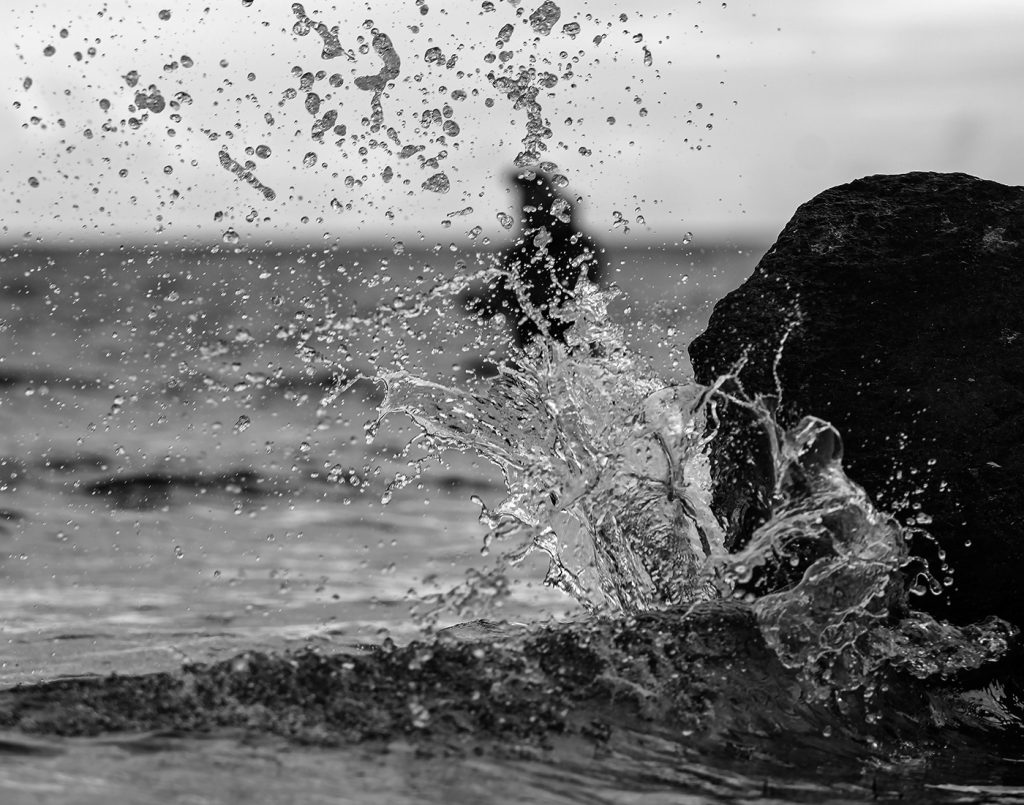
The question is not how to fish, but why you do it. The author and his fishing buddies do it out of necessity. It’s more important than life and death to them to escape the human world, step in to water and wave a stick. Left on the shore is their misery and worries. Standing in the water they find freedom, healing and occasionally a fish.
Battles are lost and won with tongue in cheek and always celebrated with mountains of cake and an endless stream of fresh espresso coffee. To the band of brothers it’s more important who you fish with than how big the fish is; except for the ones lost.
You may not learn a lot about catching more and bigger fish, but reading these stories is like holding a mirror up in front of yourself getting a little wiser. The small why is a big one.
- This artickel is written by Danish photojournalist Søren Skarby
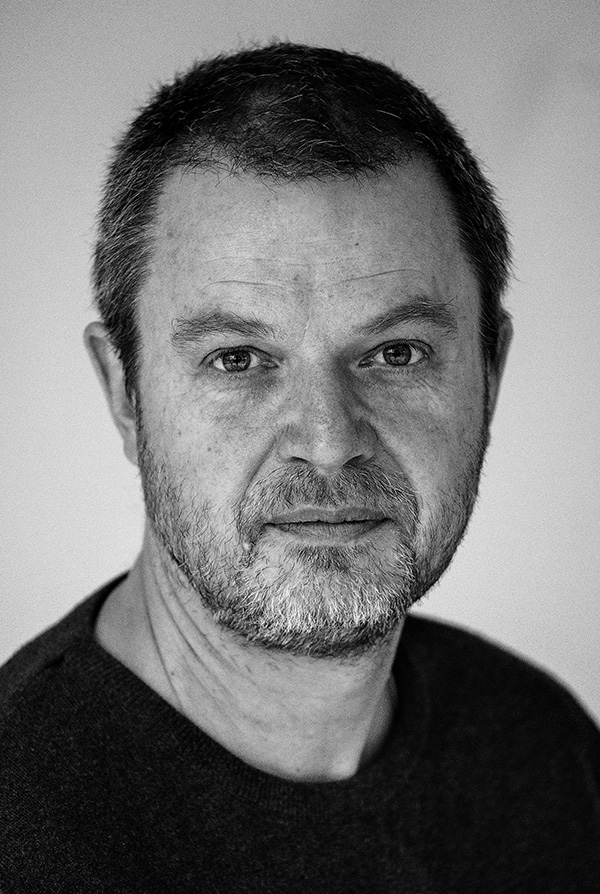
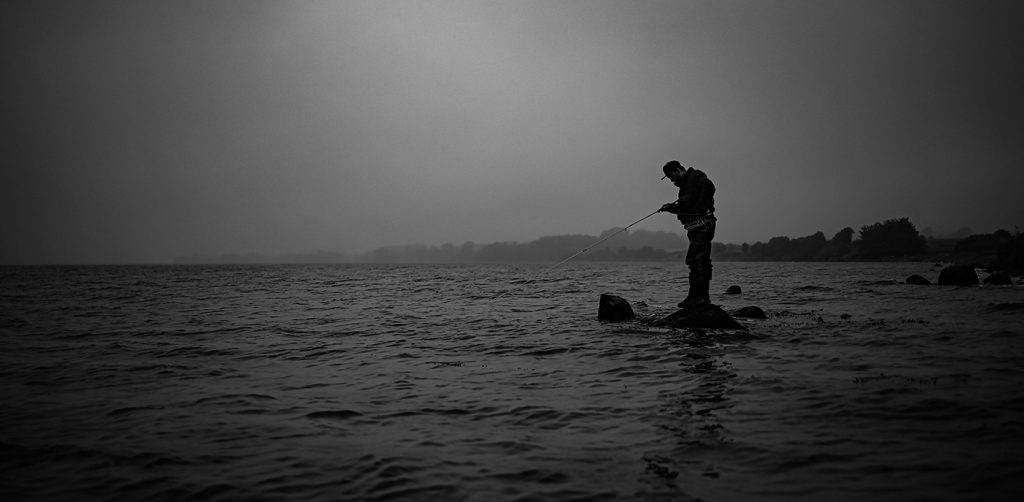
DOCTOR´S ORDERS
“Can you say that again, please?”
I looked at my physiotherapist with all the hope I could establish. The reason why I paid him a visit was, if not grim, no fun at all. For years I’ve been having heavy headaches combined with the muscles in my neck and shoulders getting stuck. The worst days can put me on the sofa horizontally unable to do anything but sleep.
Pain is one thing, but feeling dizzy is actually the most uncomfortable part of it. My doctor did send me to the hospital to get a scan in one of those tubes, which looks like the cabin you hibernate in on your way to Mars.
The nurse gave me a headset and told me that I would be able to listen to music while I was getting the scan.
“Is it pop music?” She nodded and I asked her to find some talk radio instead. So she did, but not only that. In my ears was the noise of the scanner and not one, but two radio stations. The cacophony of talk radio, pop music and the scanner was a bit over the edge. I had to zone out, so I started casting in my mind. The trout you can catch that way is beyond beauty.
The reason for the agony was revealed on the doctor’s screen. Two of the discs in my neck have not slipped, but are bulging out. Sometimes they press on the nerves and then all hell breaks loose.
I told the physiotherapist that the only thing that can cure one of those attacks, except sleep, is picking up my fly rod and escape to the water. Casting makes it all loosen up. He looked at me obviously not knowing what fly-fishing and casting is. So I explained it showing the movements and told him about the peace of mind I get doing it.
“I don’t know why, but it works” I said. His analysis was that it probably makes me relax a lot standing in the water. No doubt about that.
“If it works for you, then there’s no doubt you should go fishing as much as possible.” That music was so sweet that I asked him to put it on repeat. “And can you write it down and sign it as well, please?”
“Fly fishing on prescription sounds much better than “take two of these and call me in the morning”. One of the advantages is that it’s impossible to overdose the medicine. You can take as much as you want and then add a little extra just to make sure it’s enough. And since you don’t know how much enough is, take some more.
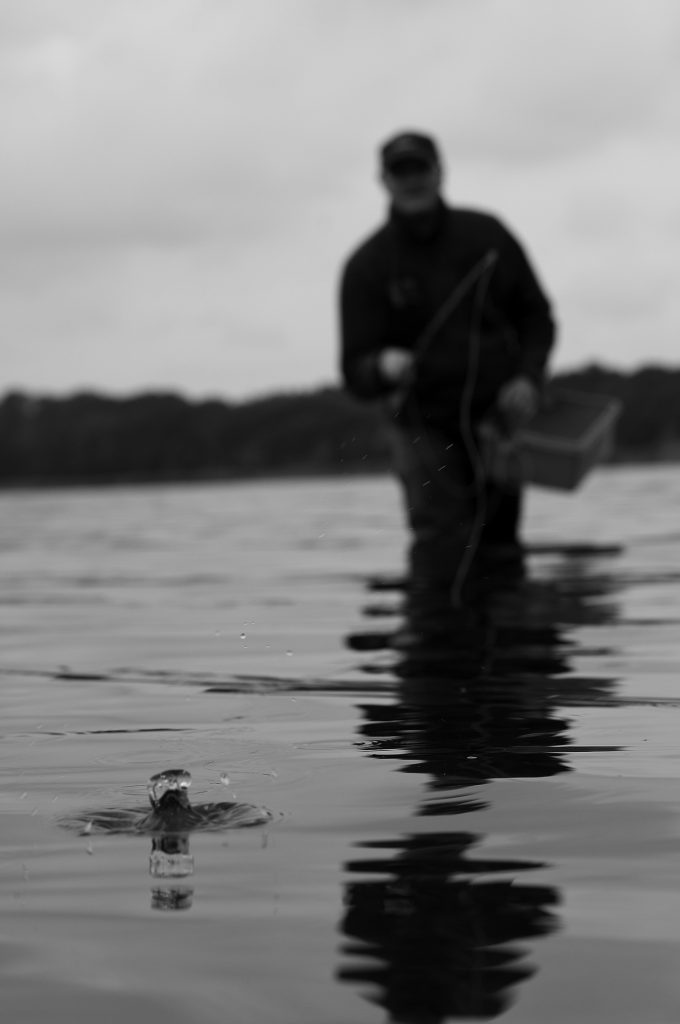
On my way home from the physiotherapist I persuaded myself to stick to the cure, no shortcuts and no procrastinations. You have to follow doctor’s orders
And so I did. From then on everything that could be done the day after or even later was left undone. My major focus was becoming healthy again.
It was early autumn when my recovery started. I drove up the coast to a place that is a bit of a gamble. With eastern wind the water looks like strong espresso coffee. It can stay like that for days and make fishing futile.
That’s why I had been watching the wind for more than a week. It was coming from the west or southwest corner all the time. That was one check box clicked. Then there’s the tide. If it’s high you have to wade pretty deep to get to the first bank and still end up casting with your arms over your head, with my poor condition that wouldn’t be the perfect medication.
After walking for more than half a mile all my worries blew away, the tide was very low and the water clear as gin. Walking on the low sand cliff above the beach I could see every stone in the water, they are bigger here since the coast is a bit rougher than my cherished home water
I went for the bench I always camp at. To my surprise there was another fisherman sitting there, so I had to ask if there was room for one more. Sure there was. I produced coffee and we started talking fishermen’s talk. It’s basically trout and flies, and flies and trout.
After a while we realized that we knew each other through friends, though we had never met before. That made things even cosier, especially when we started talking about the bench or rather the bush behind it. It’s a hawthorn and it tends to try to cover the bench, the thorns are enemy number one for waders. Once every year I bring a pair of secateurs with me and do a bit of gardening on the hawthorn. When I told him so he beamed and said that he did exactly the same. That’s probably the only time I’ll ever talk gardening with a fellow fisherman on the beach.
My newfound old friend stepped into the water, waded to the first bank and started methodically to fish while he walked slowly north up the coast. I rigged my rod and did the same. For the next hour or so nothing happened, I didn’t register even the slightest little take, but didn’t mind at all. Casting is like doing Zen meditation, repeating the same moves again and again. You disappear into a world where your mind is emptied of every thought; there is only the rod, the line and you. Lift the line, two back casts, a double haul and shoot the line, strip the fly in, take two side steps and then start all over again.
Since the wind tend to curl and twist coming along the coast or falling down from a forest behind me, I’m “casting with my ears”, feeling and hearing the small changes in the direction of the wind and trying to adjust the cast. That’s why I’m only using the hood of my wading jacket when it’s really bad weather or bitterly cold. When it works and the wind is in a friendly mood, it’s the best thing I can do standing. That’s when there’s no fish to be seen and you are just trying to cover as much water as possible.
With boils, jumps and fins in the surface it’s a totally different story. Then I switch in to hunter’s mode, trying to figure out where to present the fly, not a lot of times, but with a few precise casts. Catching a fish you have just spotted is an unbelievable satisfaction; the take is very often a short video on repeat in my mind for several weeks.
Hunger drew me out of the water and back to the bench. I poured coffee and found a sandwich in my bag. While I digested it two harbour porpoise swam along the coast far out. In closer range Mr. and Mrs Merganser were out looking for teatime snacks, they ducked a little when a flight of cormorants flew over them on their way home from a days diving and eating.
Even closer there was a small disturbance in the water. I couldn’t tell if it was just a small wave or something else, but I kept looking in that direction. A moment later it happened again and this time there was no doubt about it, a sea trout on the move. I left half a cup of warm coffee on the beach, grabbed my rod and waded out. The tide was on its way up and I had to get pretty deep in to get to the first bank. It was still there showing its dorsal fin.
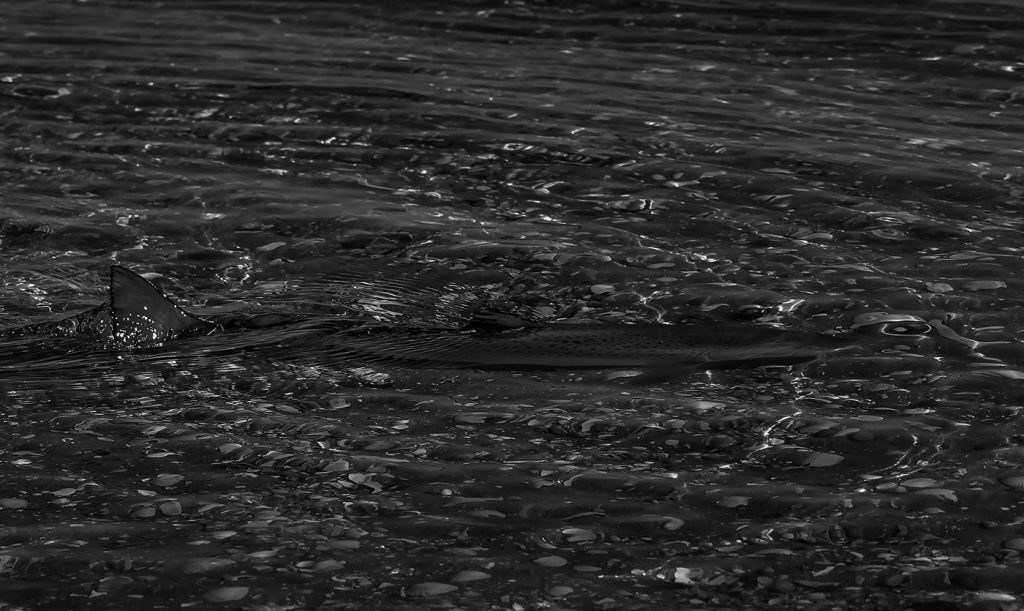
The first cast was not at the exact right spot, but the second hit bull’s eye. I only stripped the fly once and then it was violently taken. The first rush was like a Ferrari on steroids, all loose line vanished in seconds while I was praying for it not to make any knots. The brake of the reel didn’t seem to have any influence at all before half of the backing was gone. Then the fish just stopped there far out in the water. I started to retrieve the line and the fish followed. There was no second rush, no jumps or just some moving around.
It was a bit strange, that a trout that big didn’t have more energy. When it got close and I could see it in the clear water, my heart stopped beating. A graphic designer had drawn the shape of a supreme being coloured it with a golden early autumn colour and finally printed the most delicate black spots on it, it was nothing but perfect.
I just stared at it right in front of me. It was so close that not even the entire leader was outside the tip of the rod. I know that huge trout don’t always put up a big fight, but could this really be true?
I reached for the landing net hanging on my back, but before I got hold of it the answer came in form of a giant leap. The fish had saved the rest of its power just for this. And what a leap it was. Hanging in midair the fish wriggled its muscular body sending cascades of water in my face and then it landed with a gigantic splash I heard a snap, but it was seeing the hook loosing its hold that took all my attention. I just stood there, arms hanging down and saw the trout swim calmly away.
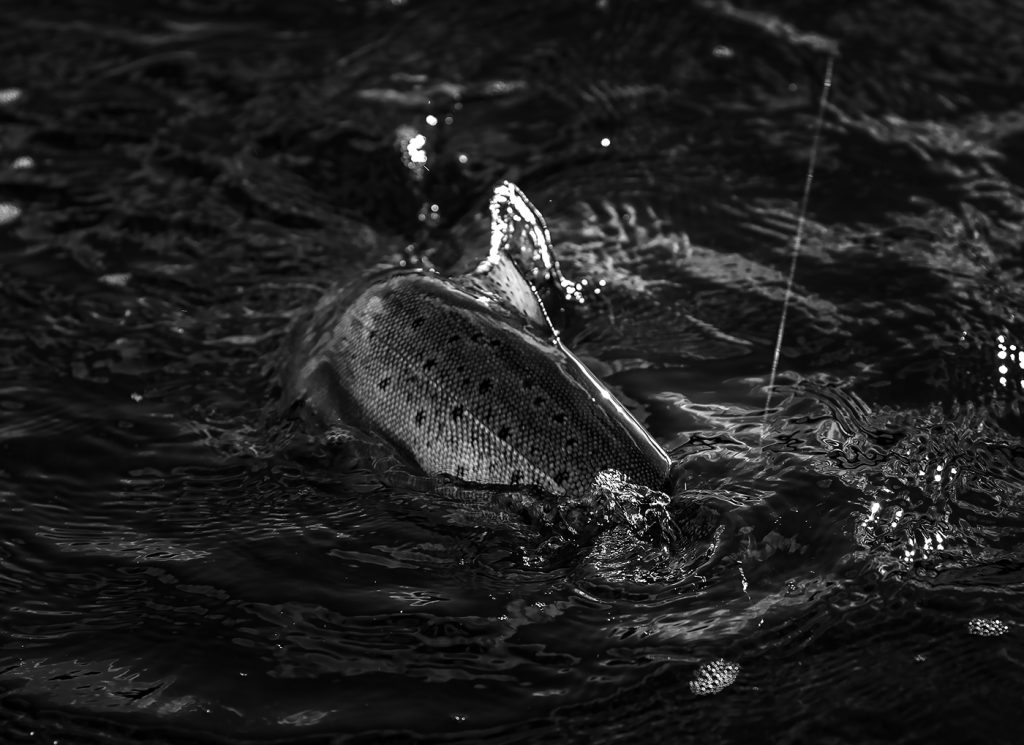
It took me some time to compose myself and then I started casting again. It didn’t work at all and I realized that the snap was the rod breaking two inches from the tip. I was defeated. Time to go home.
On the very long walk back to the car I started thinking about fly-fishing as medication. We use to say that the bitterer the pill is the better it works. This was utterly the bitterest pill I have ever tasted. It’s got to be working.
